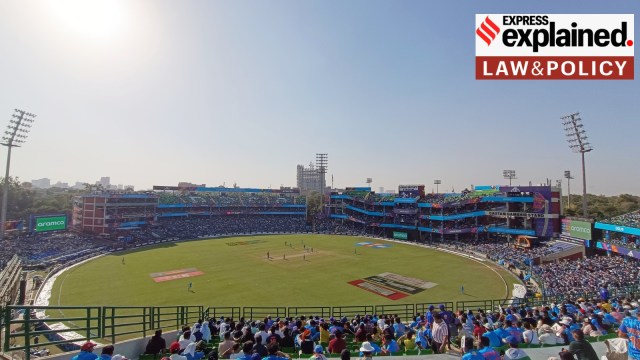© The Indian Express Pvt Ltd
Latest Comment
Post Comment
Read Comments
 The BCCI has strongly argued in court that the conduct of match-fixing squarely falls within the definition of cheating. (Wikimedia Commons/representational)
The BCCI has strongly argued in court that the conduct of match-fixing squarely falls within the definition of cheating. (Wikimedia Commons/representational)The Board of Control for Cricket in India (BCCI) has approached the Supreme Court, seeking to intervene in a pending criminal appeal. The case could decide whether match-fixing, a spectre that has long haunted Indian cricket, can be prosecuted as a criminal offence of cheating under the Bharatiya Nyaya Sanhita.
The move by the world’s richest cricket body highlights a significant legal vacuum: India, despite being a cricketing powerhouse, does not have a specific law that criminalises match-fixing. The BCCI’s intervention aims to plug this gap by arguing for a wider interpretation of the offence of cheating.
Here’s a look at the case, the current legal position and what the BCCI is seeking.
What is the Supreme Court case about?
The case, State of Karnataka & Anr v Sri Abrar Kazi & Ors, stems from allegations of match-fixing and spot-fixing in the Karnataka Premier League (KPL) in 2018 and 2019. The Bengaluru police filed a chargesheet against multiple cricket players, a KPL team owner, a Karnataka state cricket administrator and a bookie, booking them for cheating under Section 420 of the Indian Penal Code (IPC) and for criminal conspiracy under Section 120B of the IPC.
The accused approached the Karnataka High Court, arguing that the allegations, even if true, did not constitute the criminal offence of cheating. On January 10, 2022, the High Court agreed with them and quashed the criminal proceedings against them.
This prompted the State of Karnataka to file a special leave petition as an appeal in the Supreme Court, challenging the High Court’s decision. It is in this pending appeal that the BCCI has now filed an application to intervene and present its arguments.
What was the Karnataka High Court’s reasoning?
The High Court’s decision hinged on the precise ingredients of the offence of cheating under Section 420 of the IPC. To prove cheating, the prosecution must establish a “dishonest inducement to deliver any property”.
The police argued that the spectators were cheated because they were induced to buy tickets believing they were watching a fair contest. The HC rejected this argument, ruling that spectators “may have a feeling that they are going to witness a fair game being played, but, they buy the tickets voluntarily. So, question of inducement to buy ticket can be ruled out.”
It concluded that while match-fixing is a grave act of indiscipline and mental corruption, it amounts to a breach of the BCCI’s internal codes of conduct. The court stated that the BCCI is the appropriate authority to initiate disciplinary action, but match-fixing does not, by itself, give rise to a criminal offence under the IPC.
What is the BCCI’s stand in the Supreme Court?
In its intervention application, the BCCI has strongly argued against the High Court’s reasoning, contending that the conduct of match-fixing squarely falls within the definition of cheating.
The board’s primary argument is that there exists an “express or implied promise” to the paying public and sponsors that a cricket match will be played fairly and honestly. When players fix a match, they break this promise, thereby deceiving the public. This deception, the BCCI argues, dishonestly induces the public to part with its money to purchase tickets and for sponsors to invest in teams, leagues and broadcasts. Thus, the key ingredients of cheating under Section 420 of the IPC are satisfied.
The BCCI also highlighted that the prevalence of corrupt practices like match-fixing has an adverse impact on the game and undermines the integrity of the sport. It has framed its own anti-corruption code for cricketers, but stated that criminal prosecution is also necessary.
Through its intervention application, the BCCI is siding with the Karnataka government and demanding that the Supreme Court overturn the High Court’s order. A favourable ruling would empower law enforcement agencies to prosecute match-fixing cases under the existing cheating laws.
As things stand, there is no specific central law that defines and criminalises match-fixing or sports fraud. Law enforcement agencies have historically relied on the IPC sections for cheating (420) and criminal conspiracy (120B), but, as the Karnataka High Court judgment shows, this approach is legally vulnerable.
This legal vacuum has been recognised for years. The Law Commission of India, in its 276th report titled “Legal Framework: Gambling and Sports Betting including in Cricket in India”, which was published in July 2018, had noted that the existing legal framework was inadequate to deal with corruption in sports.
It recommended that match-fixing and sports fraud “should be specifically made criminal offences with severe punishments.” However, no such law has been enacted by Parliament.
Other major cricketing nations have specific laws to tackle match-fixing in sports. For example:
United Kingdom: The UK’s Gambling Act 2005 makes the “actual or attempted deception or interference in connection with… a real or virtual game, race or other event or process,” on the outcome of which a bet has been placed, a criminal offence. This definition is wide enough to cover match-fixing.
Australia: Several Australian states have specific criminal offences for engaging in conduct that corrupts a sports betting outcome. A federal agency called Sport Integrity Australia, among other things, works with different stakeholders and law enforcement agencies to coordinate and respond to betting-related corruption.
South Africa: The Prevention and Combating of Corrupt Activities Act, 2004 – the primary anti-corruption legislation in the country – makes it an offence to engage in “corrupt activities relating to sporting events”.




